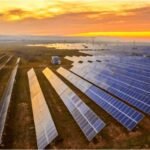Introduction to Solar Energy in Nigeria
Solar energy has emerged as a viable solution to Nigeria’s ongoing energy challenges, characterized by frequent power outages and an unreliable electricity supply. With abundant sunlight available year-round, the country is well-positioned to harness solar power effectively. Currently, solar energy installations are witnessing increased adoption across both urban and rural communities, positively impacting millions of lives.
In recent years, the Nigerian government, alongside private sector investors, has initiated various policies and programs aimed at promoting the use of renewable energy sources. Such initiatives seek to alleviate the significant energy deficit the nation faces and are particularly focused on expanding access to electricity in underserved areas. The growing number of solar energy projects reflects a collective movement towards sustainability, with both households and businesses making the transition from conventional power sources to solar options.
The benefits of solar energy extend beyond merely providing electricity. With the reduction of dependency on fossil fuels, Nigeria can work towards decreasing its carbon emissions and contributing to the global fight against climate change. Additionally, solar power installations create economic opportunities through jobs in manufacturing, installation, and maintenance of solar systems. By supporting local economies, solar energy adoption promotes not only environmental advocacy but also economic empowerment.
Moreover, as technological advancements continue to lower the cost of solar panels and batteries, many households and businesses find it increasingly affordable to invest in solar power solutions. With favorable policies encouraging investment in renewable energy, the momentum for solar power adoption is likely to grow. In this context, it is crucial to explore the hidden benefits that come along with transitioning to solar energy, illuminating the additional incentives that make this shift advantageous for individuals and communities across Nigeria.
Economic Savings Beyond the Initial Investment
Transitioning to solar energy in Nigeria presents numerous economic advantages that extend well beyond the initial outlay involved in installation. Primarily, solar power can lead to substantial reductions in electricity expenses, offering a viable alternative to conventional power sources that often incur hefty monthly fees. For households and businesses dependent on erratic electricity supply, the financial burden of generator maintenance and fuel costs can be considerable. By investing in solar energy, users can mitigate their reliance on these sources, leading to remarkable long-term savings on utility bills.
Additionally, as the cost of solar technology continues to decrease, it becomes more feasible for consumers to make this switch. The effectiveness of solar energy systems in sunny regions like Nigeria means that users can generate their own electricity and potentially receive credits for any excess power produced. This aspect further contributes to the financial benefits of going solar. Moreover, solar installations often come with warranties that can exceed 25 years, ensuring supporters can reap the rewards of their investment for decades.
Furthermore, there are various government incentives and financing options available that can alleviate the economic burden associated with the initial investment. Initiatives aimed at promoting renewable energy usage in Nigeria can aid consumers in accessing lower-interest loans, grants, or tax breaks that make solar energy more accessible. These incentives are designed to encourage citizens to take advantage of renewable resources while reducing dependence on traditional energy systems that come with volatile costs.
Thus, with careful planning and awareness of available resources, individuals and businesses in Nigeria can harness solar energy not only as a sustainable solution but also as a significant avenue for long-term economic savings.
Environmental Impact: A Sustainable Choice
As Nigeria grapples with challenges related to energy provision and environmental degradation, the adoption of solar energy presents a remarkable opportunity to make significant strides towards sustainability. Transitioning to solar energy not only addresses the energy needs of the population but also results in a considerable reduction in carbon footprints. Solar power generation produces minimal greenhouse gas emissions compared to traditional fossil fuels. By harnessing the abundant sunlight available, Nigeria can drastically decrease its reliance on oil, which contributes heavily to air pollution and climate change.
Moreover, utilizing solar power has the potential to conserve water resources. Conventional energy production processes, particularly those involving coal and natural gas, are water-intensive, requiring substantial amounts for cooling and extraction processes. In contrast, solar energy systems use negligible water during their operation. This is particularly vital in a country like Nigeria, where water scarcity can pose significant challenges. By opting for solar energy, Nigeria can effectively promote water conservation, ensuring that this essential resource remains available for other critical uses.
Additionally, the environmental benefits extend to promoting biodiversity. The deployment of solar energy installations, when done responsibly, minimizes habitat disruption and can even improve land use by repurposing underutilized areas for solar farms. These installations have the potential to coexist harmoniously with local ecosystems, thus fostering an environment conducive to the growth of various species. Clean air resulting from reduced emissions will not only benefit human health but will also help sustain wildlife populations that are often adversely affected by pollution.
In summary, the transition to solar energy not only aligns with global efforts to combat climate change but also offers a pathway toward a more sustainable future for Nigeria. By embracing solar power, the nation can enhance its environmental stance, contributing to cleaner air, water conservation, and the preservation of biodiversity.
Energy Independence and Security
Energy independence is a crucial aspect of modern living, particularly in Nigeria, where the national power grid has often been unreliable. Solar power emerges as a viable and strategic solution for households and businesses seeking to establish a reliable energy source. By harnessing the sun’s energy through solar panels, Nigerians can generate their own electricity, thereby reducing dependence on the national grid and the uncertainties associated with it.
The benefits of energy independence are manifold. Firstly, adopting solar energy can shield communities from the volatility of energy prices. Fluctuations in fossil fuel costs can lead to unpredictable electricity bills, placing a financial burden on households and businesses. In contrast, solar power allows users to produce their electricity at a relatively constant cost, irrespective of the market’s shifting dynamics. This stability enhances financial planning and can contribute to the overall economic resilience of families and organizations.
Moreover, solar power alleviates the risks associated with frequent blackouts that plague many areas in Nigeria. These power outages can disrupt daily activities, hinder productivity, and even impact critical services such as healthcare and education. By investing in solar energy systems, communities gain the ability to maintain their power supply, thus ensuring that refrigeration, lighting, and essential services continue without interruption. The empowerment that comes with energy self-sufficiency not only boosts individual households but also uplifts entire communities, fostering a sense of resilience and confidence.
Additionally, the decentralization of energy production afforded by solar technology can greatly enhance energy security. Localized power generation reduces reliance on centralized power stations, which are often susceptible to overloads and maintenance issues. In this scenario, solar energy systems contribute to an overall stable and reliable electrical infrastructure, enabling communities to thrive irrespective of national circumstances.
Job Creation and Economic Growth Opportunities
The solar energy sector in Nigeria holds significant promise for job creation and economic growth. As the country increasingly turns towards renewable energy to address its power supply challenges, a burgeoning solar industry emerges, which can create numerous employment opportunities across various domains. From manufacturing solar panels to the installation and maintenance of solar power systems, the potential for job creation in these sectors is substantial.
Manufacturing solar technologies locally not only generates jobs but also stimulates economic activity within communities. Establishing factories dedicated to the production of solar panels, inverters, and batteries can foster a skilled workforce, as employees undergo training and development in new technologies. This shift towards local manufacturing can reduce reliance on imported solar technologies, ultimately supporting the economy and contributing to a trade balance that favors domestic growth.
Moreover, the installation and maintenance of solar systems are critical components of the value chain that can create a myriad of service jobs. Skilled technicians and electricians will be essential for the installation processes, while ongoing maintenance will require a dedicated workforce. This scenario opens doors for entrepreneurial ventures, as individuals can start small businesses focusing on solar installation services or provide maintenance contracts, increasing local employment levels.
In addition to the direct job creation, the solar energy sector promotes broader economic benefits through innovation and entrepreneurship. As startups and smaller companies enter the market, diverse solutions and technologies tailored to Nigeria’s unique needs will emerge. The potential for innovation not only enhances the solar industry’s growth but also encourages other sectors to adopt renewable energy solutions, further driving economic development.
In conclusion, the burgeoning solar energy sector in Nigeria presents promising opportunities for job creation and economic growth, making it an essential component of the nation’s transition towards sustainable energy sources.
Increased Property Value
The adoption of solar energy systems in Nigeria has been increasingly recognized not only for its ecological benefits but also for its impact on real estate. Homes equipped with solar panel installations have shown a trend of increased property values, making them a compelling investment for prospective homeowners. According to several studies, properties with solar energy systems tend to sell at higher prices compared to those without. This phenomenon is attributed to both the cost savings associated with reduced utility bills and the appeal of sustainable living.
In Nigeria, where electricity supply can be intermittent, having a reliable solar power system can significantly enhance a property’s attractiveness. Homebuyers often seek homes that are energy-independent, thus willing to pay a premium for solar-equipped properties. A report from the Nigerian Renewable Energy Association indicates that homes with solar systems can experience up to a 15-20% increase in resale value. This is particularly significant in urban areas where energy costs are higher and reliability is a concern.
Moreover, solar installations contribute to future-proofing properties against increasing energy rates. As global energy markets shift and local supply challenges continue, homes that harness solar energy can provide long-term savings, making them more desirable for future buyers. Real estate agents are increasingly highlighting solar energy systems as a unique selling point, which aligns with contemporary buyer preferences for sustainable living solutions. Ultimately, embracing solar technology not only reduces a household’s carbon footprint but also serves as a strategic improvement to property value, appealing to both current and prospective homeowners in Nigeria.
Community Engagement and Development
The integration of solar energy projects in Nigeria has proven to be more than just an environmental strategy; it has emerged as a catalyst for community engagement and development. The adoption of solar technology has enabled local communities to actively participate in energy solutions that directly affect their lives. Through initiatives such as community solar farms, essential infrastructure improvements have been realized, addressing local energy needs while simultaneously promoting social cohesion.
For instance, when villages invest in solar panel installations, they not only gain access to stable power sources but can also enhance their communal facilities. Schools can now operate in the evenings, clinics can maintain refrigeration for medical supplies, and small businesses can extend their working hours, all thanks to the reliable energy provided by solar systems. This dual benefit of energy generation and infrastructure improvement instills a sense of ownership among community members, fostering pride in their ability to manage their resources effectively.
Moreover, these projects often encourage collaborative efforts among locals, community leaders, and non-profit organizations. Workshops and training sessions to maintain solar equipment create job opportunities and enhance skill sets within the community. Through participative decision-making, community members feel their voices are heard, leading to stronger social bonds and collective responsibility towards communal assets.
The transformation brought about by solar initiatives extends beyond mere energy provision. By enhancing local infrastructure and promoting community cooperation, solar energy invariably cultivates an environment of trust and mutual respect. This, in turn, leads to further innovations as community members become more confident in engaging with broader renewable energy initiatives. The result is a synchronized development pattern that elevates both the economic and social frameworks of these communities.
Technological Advancements and Innovations
The evolution of solar technology in Nigeria has witnessed significant advancements, positioning it as a viable and sustainable energy source for millions. One of the notable innovations includes the development of solar batteries, which store excess energy generated during the day. These batteries facilitate consistent energy supply, especially in off-grid areas, thereby reducing reliance on traditional generators and fossil fuels. As a result, users can enjoy a seamless energy experience, even during power outages.
Off-grid solar systems have also emerged as a crucial solution for Nigeria’s energy challenges. These systems are particularly beneficial in rural and semi-urban areas where grid connectivity is limited. By harnessing solar power, households can significantly reduce their energy expenses while enjoying the flexibility of independent energy production. The installation of off-grid systems is accompanied by a range of options, including mini-grids and solar home systems, making it more accessible for various socio-economic groups.
In addition to solar batteries and off-grid systems, innovations in smart solar solutions are transforming how energy consumption is managed. These technologies include solar inverters with built-in monitoring systems that allow users to track their energy generation and consumption in real time. Smart grids, combined with solar energy, pave the way for improved energy management, optimizing the use of resources and enhancing overall efficiency. Consequently, users can make informed decisions about their energy usage, potentially lowering their carbon footprint while maximizing savings.
Overall, the integration of these technological advancements in solar energy is pivotal for promoting efficient energy solutions in Nigeria. As more individuals and businesses adopt these innovative systems, the potential for widespread renewable energy accessibility becomes increasingly feasible, contributing to the nation’s sustainable development goals.
Conclusion: A Bright Future with Solar Energy
In Nigeria, solar energy presents a multitude of hidden benefits that extend beyond mere access to power. This renewable energy source offers significant advantages not only for individual households but also for entire communities and the nation at large. By adopting solar power solutions, residents can experience substantial savings on their energy bills, making it an economically viable alternative to traditional forms of energy.
Moreover, the promotion of solar energy helps to reduce reliance on fossil fuels, contributing to a healthier environment. As Nigeria continues to grapple with the challenges of energy shortages and environmental degradation, a transition to solar energy can mitigate these issues. The adoption of solar technologies bolsters energy security, reduces greenhouse gas emissions, and supports a sustainable future for this rapidly growing nation.
Beyond economic and environmental benefits, the shift towards solar energy fosters social equity. By providing rural and underserved communities with reliable access to electricity, solar power can empower individuals, enhance educational opportunities, and stimulate local economies. Furthermore, the proliferation of solar installations creates job opportunities within the renewable energy sector, paving the way for a skilled workforce equipped to tackle both national and global energy challenges.
In conclusion, transitioning to solar energy in Nigeria is not merely a reaction to current energy shortages; rather, it represents a strategic investment in the future. Embracing solar energy has the potential to unlock numerous advantages that can benefit individuals, communities, and the nation as a whole. By considering solar energy as a viable option, Nigerians can work towards a more sustainable and prosperous future, characterized by energy independence and environmental stewardship.


